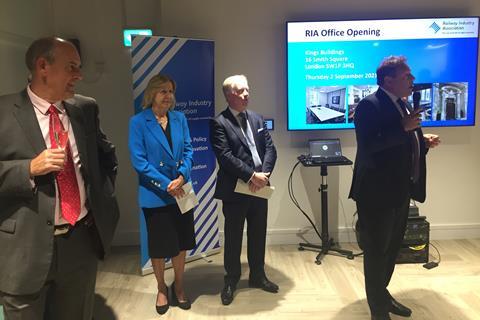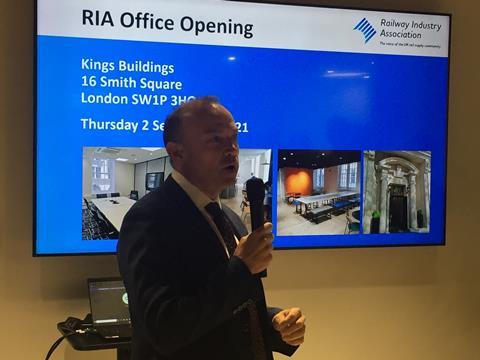
UK: ‘I am very, very positive about the future’, insisted Railway Industry Association Chief Executive Darren Caplan, speaking at the opening of the association’s new offices in Westminster on September 2.
While the UK rail sector had been severely impacted by the coronavirus pandemic, Caplan suggested that rail was well placed to support a strong economic recovery. ‘Look at the last 100 years, we’ve had wars, recessions, tough economic cycles, and yet rail has bounced back every time. I expect the markets to be back on track within five years or so.’
Emphasising the importance of putting the supply sector ‘at the heart of the government’s agenda for “building back better”’, Caplan reiterated that rail investment helped to create jobs and economic activity. He listed ‘4 Gs’ where rail could support that broader agenda:
- Growth — studies indicated that every £1 invested in rail generated at least £2·20 in economic activity;
- Geography — a national rail network supported the ‘levelling-up’ vision, connecting the capital with the north, south, east and west, as well providing essential regional connectivity;
- Green — modal shift to rail will support the decarbonisation of the transport sector as part of the drive to net zero by 2050, while a rolling programme of electrification would help to decarbonise the rail mode a decade sooner;
- Global — the rail supply sector was contributing to exports, with up to £800m of sales in recent years.
However, he pointed out, ‘there are things that have to be done to make that happen. We need to get schemes built, we need certainty around the HS2 [Phase 2b] Eastern Leg, and we need to address the decarbonisation agenda with a rolling programme of electrification as well as fleets of hydrogen and battery trains.’
Meanwhile, he suggested, the rail sector needed to keep making its own case for future investment, calling on RIA members ‘to be passionate about it’.

Reminding attendees that the government had pumped more than £12bn into supporting operations and enhancement projects through the pandemic, Rail Minister Chris Heaton-Harris said rail did much for local communities as well as supporting the government’s wider agenda. He looked forward to the return of passenger traffic as well as growth in the freight sector. However, despite a strong customer focus, there were ‘not enough people travelling for now’.
Recognising that commuting patterns in particular were likely to change as a result of working from home, Heaton-Harris said DfT figures were showing a significant shift between business and leisure travel. As a result, he suggested, ‘we need to sweat our assets in a different way’.
Recognising RIA’s calls for greater certainty, the minister confirmed that the long-overdue rail network enhancements programme would be published ‘eventually’. However, in the light of the forthcoming spending review, he emphasised that ‘we must make sure that we get proper value for money’ from future investment.
He reiterated the importance of rail in supporting the levelling-up agenda, and the need to ‘bring our Victorian infrastructure into the 21st century’, to create a more accessible, resilient and greener railway. Pointing to the work now underway on HS2 as well as other enhancement schemes, he concluded that ‘we have been putting money behind it like never before’.



